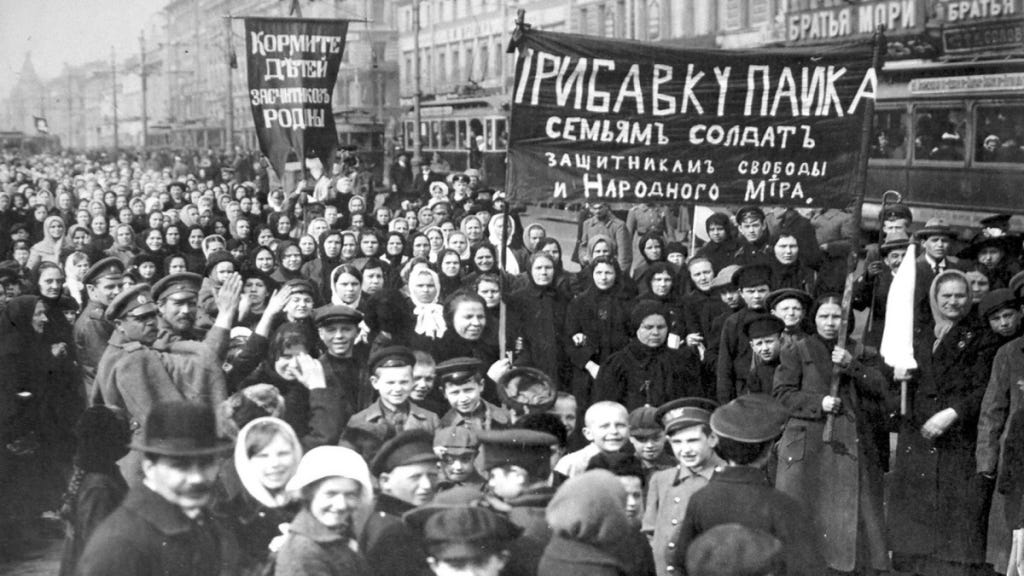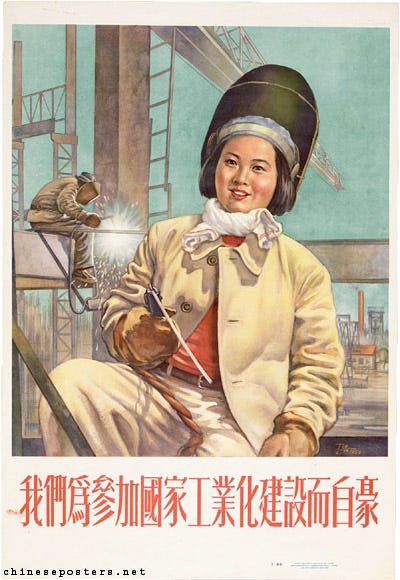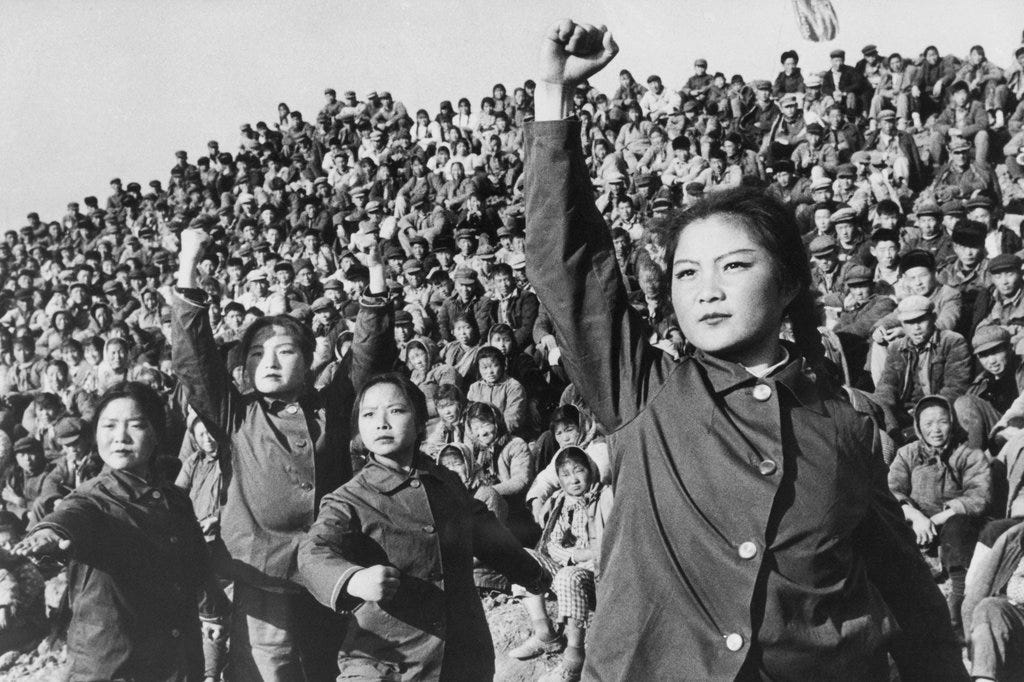Women Hold up Half the Sky!
March 8 is International Women's Day. On this day in 1917, the February Revolution started as female workers protested over the rationing measures that the Russian Empire implemented for World War 1. While that revolution was only a bourgeois-democratic revolution, the proletariat and peasantry were heavily involved in it, and they were able to build their own power via their soviets (councils) thanks to this revolution.
Now, what do we have to do with women's rights? As communists, we support the unity of the working class. Women's oppression, though taking on different forms in different modes of production, originated in class society; pre-capitalist class society had patriarchy, and while capitalism destroyed that patriarchy, it maintained the contradiction between male and female workers. Queer oppression had a similar trajectory. We can see this in Friedrich Engels's The Origin of the Family, Private Property and the State, in Chapter 2, Part 3:
Thus, on the one hand, in proportion as wealth increased, it made the man’s position in the family more important than the woman’s, and on the other hand created an impulse to exploit this strengthened position in order to overthrow, in favor of his children, the traditional order of inheritance. This, however, was impossible so long as descent was reckoned according to mother-right. Mother-right, therefore, had to be overthrown, and overthrown it was. This was by no means so difficult as it looks to us today. For this revolution—one of the most decisive ever experienced by humanity—could take place without disturbing a single one of the living members of a gens. All could remain as they were. A simple decree sufficed that in the future the offspring of the male members should remain within the gens, but that of the female should be excluded by being transferred to the gens of their father. The reckoning of descent in the female line and the matriarchal law of inheritance were thereby overthrown, and the male line of descent and the paternal law of inheritance were substituted for them.
[Source]
As we said, capitalism destroyed patriarchal relations and replaced them with cash relations for women; women are now forced into highly exploited jobs with lower wages and higher surplus-value production. Lenin wrote on this in "Capitalism and Female Labor":
Present-day capitalist society conceals within itself numerous cases of poverty and oppression which do not immediately strike the eye. At the best of times, the scattered families of poor townspeople, artisans, workers, employees and petty officials live in incredible difficulties, barely managing to make both ends meet. Millions upon millions of women in such families live (or, rather, exist) as “domestic slaves”, striving to feed and clothe their family on pennies, at the cost of desperate daily effort and “saving” on everything—except their own labour.
It is these women that the capitalists most willingly employ as home-workers, who are prepared for a monstrously low wage to “earn a little extra” for themselves and their family, for the sake of a crust of bread. It is from among these women, too, that the capitalists of all countries recruit for themselves (like the ancient slave-owners and the medieval feudal lords) any number of concubines at a most “reasonable” price. And no amount of “moral indignation” (hypocritical in 99 cases out of 100) about prostitution can do anything against this trade in female flesh; so long as wage-slavery exists, inevitably prostitution too will exist. All the oppressed and exploited classes throughout the history of human societies have always been forced (and it is in this that their exploitation consists) to give up to their oppressors, first, their unpaid labour and, second, their women as concubines for the “masters”.
Slavery, feudalism and capitalism are identical in this respect. It is only the form of exploitation that changes; the exploitation itself remains.
[Source]
Only under socialism, the dictatorship of the proletariat, can the issue of women's oppression truly be solved. Bourgeois "radical feminists" call for women to fight men, but Marxists know that the contradiction between genders is non-antagonistic and fundamental to class society, so it will go away under socialism and cease to exist in communism (when class society does not exist). Clara Zetkin said this in "Only in Conjunction With the Proletarian Woman Will Socialism Be Victorious":
As far as the proletarian woman is concerned, it is capitalism’s need to exploit and to search incessantly for a cheap labor force that has created the women’s question. It is for this reason, too, that the proletarian woman has become enmeshed in the mechanism of the economic life of our period and has been driven into the workshop and to the machines. She went out into the economic life in order to aid her husband in making a living, but the capitalist mode of production transformed her into on unfair competitor. She wanted to bring prosperity to her family, but instead misery descended upon it. The proletarian woman obtained her own employment because she wanted to create a more sunny and pleasant life for her children, but instead she became almost entirely separated from them. She became an equal of the man as a worker; the machine rendered muscular force superfluous and everywhere women’s work showed the same results in production as men’s work. And since women constitute a cheap labor force and above all a submissive one that only in the rarest of cases dares to kick against the thorns of capitalist exploitation, the capitalists multiply the possibilities of women’s work in industry. As a result of all this, the proletarian woman has achieved her independence. But verily, the price was very high and for the moment they have gained very little. If during the Age of the Family, a man had the right (just think of the law of Electoral Bavaria!) to tame his wife occasionally with a whip, capitalism is now taming her with scorpions. In former times, the rule of a man over his wife was ameliorated by their personal relationship. Between an employer and his worker, however, exists only a cash nexus. The proletarian woman has gained her economic independence, but neither as a human being nor as a woman or wife has she had the possibility to develop her individuality. For her task as a wife and a mother, there remain only the breadcrumbs which the capitalist production drops from the table.
Therefore the liberation struggle of the proletarian woman cannot be similar to the struggle that the bourgeois woman wages against the male of her class. On the contrary, it must be a joint struggle with the male of her class against the entire class of capitalists. She does not need to fight against the men of her class in order to tear down the barriers which have been raised against her participation in the free competition of the market place. Capitalism’s need to exploit and the development of the modern mode of production totally relieves her of having to fight such a struggle. On the contrary, new barriers need to be erected against the exploitation of the proletarian woman. Her rights as wife and mother need to be restored and permanently secured. Her final aim is not the free competition with the man, but the achievement of the political rule of the proletariat. The proletarian woman fights hand in hand with the man of her class against capitalist society. To be sure, she also agrees with the demands of the bourgeois women’s movement, but she regards the fulfillment of these demands simply as a means to enable that movement to enter the battle, equipped with the same weapons, alongside the proletariat.
[Source]
We are not class reductionists, though; even when the workers control the economy, reactionary ideology will persist so long as classes and class conflict persist. The workers will need to fight chauvinism among its ranks, and that includes sexism. That is why cultural revolutions are necessary in the socialist transition to communism.
Women have been heavily involved in the proletarian class struggle. They started the February Revolution, as we mentioned earlier. Vladimir Lenin's wife, Nadezhda Krupskaya, was a revolutionary with Lenin, and after the proletariat seized power in the October Revolution, she became the Deputy Minister of Education; she led the construction of the socialist education system in the USSR. That education system allowed the Soviet workers to be trained properly, making the rapid industrialization of the Stalin era and the subsequent military successes against the Nazi hordes possible.
Speaking of that anti-fascist war for the defense of the proletarian state and motherland, women were mobilized in production and in the war effort itself; only the Soviet Union (and perhaps the Chinese communists in their own war against Japanese imperialism) allowed women to be soldiers of the Red Army, and those courageous comrades killed more than enough of the Nazi bastards.
In China, from the start of the revolution, women were able to liberate themselves not only from the shackles of feudalism and bureaucratic-comprador capitalism, but also from the real patriarchy that existed in that semi-feudal society. China was far poorer than Russia, which was already poor enough, and its culture was more reactionary; look no further than the brutal practice of foot-binding. Thanks to the revolution, women were liberated and given the same opportunities as men; peasant and proletarian women were not oppressed like they would have been under bourgeois "feminists", but they were masters of society along with their male comrades.
The Great Proletarian Cultural Revolution, the mass movement that occurred to try and protect China from capitalist restoration and the persistence of a reactionary superstructure, empowered women to further break down gender stereotypes, and it made the superstructure fit the advanced socialist relations of production.
Mao's wife, Jiang Qing, became an instrumental leader in the Cultural Revolution. She and her allies, the so-called "Gang of Four" (a comedic name given by Mao), led the proletarian line in China's class struggle during that period.
After the capitalist coup following Mao's death, she and other revolutionaries were jailed for their "crimes". Thus, Jiang is a common target of anti-communist lies, and in particular those of the new capitalist-imperialist regime in modern China. We can easily refute those myths with the experiences of the Chinese workers and peasants who lived in her time:
When the Gang of Four was arrested, the Chinese government said the people were really happy. That was not true. In my home town many young people really respected Jiang Qing because of an incident that happened in a neighbouring commune. On Chinese New Year in 1975, the village leader played over the loudspeaker a traditional drama which was criticized during the Cultural Revolution. A young man in the village criticized the village leader for playing that over the loudspeaker. But the village leaders accused him of causing trouble in the village. He called the police and the police took him away. While he was in prison, he wrote a letter to Jiang Qing, and in less than five days, Jiang Qing responded to his letter. Jiang Qing ordered that the person be released. And the village leader was dismissed from office. Young people in my area loved Jiang Qing. When the Gang of Four was arrested a few weeks after Mao died, we knew things were going to be different.
[Source]
In Albania, women made up much of the socialist legislative assembly. Enver Hoxha said this: "The entire Party and country should wake up, throw into the flames and twist the neck of any one who tramples underfoot the sacred law of the Party in defense of the rights of women and girls" [Source]. And that is exactly what the masses did when they controlled the Albanian state and society.
The revolutionaries fighting the ongoing protracted people's wars in the world have done a lot of work in fighting patriarchy in their semi-feudal, semi-colonial countries. They mobilize women in their armies, have women leading the masses with their parties, and organize women in the mass organizations which help build new power. For instance, the Communist Party of India (Maoist) and the People's Liberation Guerrilla Army are both mostly run by women; about 60% of the party's cadres are women, and in liberated areas, oppressive customs on women have been struggled against. All of the other communist parties are extremely successful in fighting gender inequality as part of their struggles for socialism and communism.
The only way to women's genuine liberation from sexism lies in the struggle for socialism and communism. When the proletariat holds power, the people can smash the reactionary superstructure, and they can resolve the contradiction between men and women with communism!









